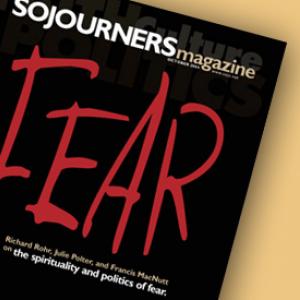
Julie has been a member of the Sojourners magazine editorial staff since 1990. For the last several years she has edited the award-winning Culture Watch section of the magazine. In her time at Sojourners she has written about a wide variety of political and cultural topics, from the abortion debate to the working class blues. She has coordinated in-depth coverage of Flannery O’Connor, campaign finance reform, Howard Thurman, the labor movement, and much more.
She studied English literature at Ohio State University and has an M.T.S. (focused on language and narrative theology) from Boston University and an M.F.A. in creative nonfiction from George Mason University.
Julie grew up on a farm in the northwest corner of Ohio. She has been fascinated by the power of religious expression in and through culture since she can remember. Obsessively listening to her older sister’s copy of the Jesus Christ Superstar cast recording when she was 10 was an especially crystallizing experience. In addition, Julie’s mother often argued about doctrine and the Bible and took her at least weekly to the public library, both of which were useful background for Julie’s current work.
She lives in the Columbia Heights neighborhood of Washington, D.C. and is a member of St. Margaret’s Episcopal Church (where she had an unlikely four-year reign as rummage sale czarina). Her personal interests overlap nicely with her professional ones: Music, books, reading entertainment, culture, and religion writing, art, architecture, TV, films, and knowing more celebrity gossip than is probably wise or healthy. To make up for all that screen time, she tries to grow things, hike occasionally, and wonder often at the night sky.
Some Sojourners articles by Julie Polter:
Replacing Songs with Silence
Censorship, banning, blacklists: What’s lost when governments stifle musical expression?
Extreme Community
A glimpse of grace and abundance from - of all things - reality TV.
The Cold Reaches of Heaven
Nobel Prize-winning physicist Bill Phillips talks about his faith.
Just Stop It
Daring to believe in a life without logos. An interview with journalist Naomi Klein.
Women and Children First
Developing a common agenda to make abortion rare.
Obliged to See God (on Flannery O’Connor)
Posts By This Author
All We Hunger For
My mother was a Depression baby in rural North Carolina. At an early age she knew what it was to be hungry, unsure of when and what her next meal would be. As an adult with her own family, she oversaw cupboards jammed with canned goods, a large chest freezer packed with parcels of meat wrapped in white butcher paper and plastic boxes of last summer’s strawberries and sweet corn, and a basement that held dozens of jars of home-canned pickles, green beans, cherries, beets, and jam.
No one within shouting distance of her (and the woman could shout) was going to know anything about hunger. Food was security, in several senses of the word—both preparation to meet real physical needs and contingencies and, I am quite sure, a salve for deep emotional and spiritual wounds inflicted by a difficult and sometimes violent upbringing.
As Christians, many different interpretations of the phrase “food security” are appropriate for our attention. The church often splits over interpretation of Bible verses such as “he has filled the hungry with good things” (Luke 1:53). Some factions favor a purely this-world, material understanding; others take those words as only metaphor for a spiritual feast. But, God’s ongoing dream for us seems to include both satisfying our hunger and thirst for the living bread and water that heals and nourishes our sin-sick souls and providing the literal bread and water to keep our bodies alive, blessed, and blessing. In either case, the promise isn’t to fill us with whatever puffed-air and high-fructose-corn-syrup spiritual or material amalgam is handy, but rather with “good things.”
Replacing Songs with Silence

Photo via Victor Wong / Shutterstock
To sing or to die: now I will begin. There’s no force that can silence me. —Pablo Neruda, “Epic Song”
In a world so torn by poverty and war, perhaps music can seem like a secondary concern. But as Christians know so well, music feeds the spirit, comforts the downtrodden, strengthens the weary, and can give words a power they do not possess on paper. Imagine life without your favorite hymn or the song that safely channeled your teenage rebellion, or the anthem of peace or protest that still stirs you. Imagine life without Bach or Handel, or Neil Young, or Billie Holiday singing “Strange Fruit” (dismissed in its day by Time magazine as “a prime piece of musical propaganda”).
Imagine if someone literally took away your song. Wouldn’t you hunger for it like bread?
When a government or powerful religious or ethnic group tries to turn off the music, the stakes are high. Music is another way to hear the news and a means to find common passion between very different peoples. In this way silence, or a restricted diet of state-approved tunes, can diminish us. But the more immediate and sometimes tragic cost is borne by the artists around the globe who have faced intimidation, loss of livelihood, imprisonment, torture, and even death for recording, performing, or distributing their music:
- South Africa revoked singer Miriam Makeba’s citizenship and right of return after her 1963 testimony about apartheid before the United Nations.
- Populist Chilean folk/political singer and songwriter Victor Jara was one of several musicians who supported the successful 1970 campaign of Salvador Allende to become president of Chile. When a 1973 military coup overturned the Allende government, Jara was among the thousands of citizens subsequently tortured and executed. His torturers reportedly broke his hands so that he couldn’t play his guitar; his final lyrics, written on scraps of paper during the few days before he was killed, were smuggled out by survivors.
Peace by Degree
Conflict may be an inevitable part of life, but how you deal with it isn't. Many schools are teaching a better way.
Extreme Community
The Power of the Word
The Politics of Fear
Especially in a contentious election year, I find it difficult not to be skeptical when the Department of Homeland Security issues terror alerts. When the alert level was raised just after the Democratic Convention, for example, the specific details
End-of-Life Ethics
A Companion to the Spiritual Life
Flannery O'Connor was a master short-story writer, dark humorist, and astute cultural observer.
The Cold Reaches of Heaven
Nobel Prize-winning physicist Bill Phillips talks about his faith
Martha Stewartship
A Few of My Favorite Things
A few blocks away, a sidewalk mailbox is covered with a magic-marker tribute to a young man downed in a shooting—"RIP Boo"




